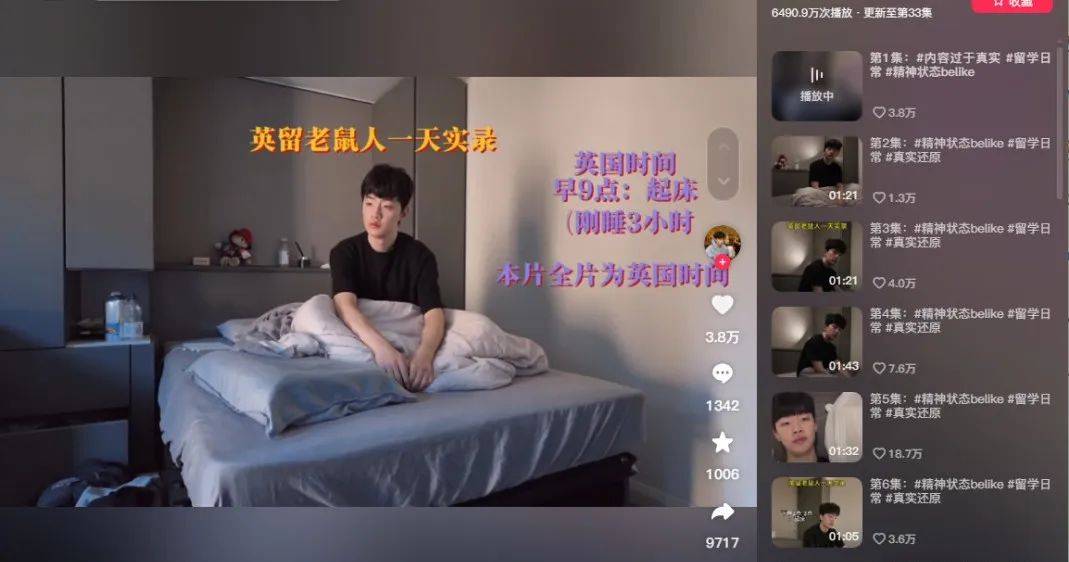The Anhui University student identifies as a typical "rat person". His single bed in the dormitory is his "rat's nest," and the space enclosed by blackout curtains is his "rat world".
The "rat people" lifestyle reportedly originated in Russia. It describes young people with few desires, living in rented rooms, eating cheap fast food, reversing their sleep cycles, minimizing physical activity to conserve energy, and remaining socially withdrawn. In recent months, this lifestyle has spread rapidly in China, becoming a new phenomenon after trends like "Buddhist youth" (a detached lifestyle), "lying flat" (rejecting the rat race), and "whatever" (apathetic).
Amidst a slowing economy, rising youth unemployment, and fierce job competition, the keyword "rat people" has garnered nearly 2 billion views on social media, resonating with young people.
 |
Blogger "Timothy" began posting videos titled "A Day in the Life of a Rat Person Studying Abroad in the UK," attracting many empathetic young viewers. Photo: Paper |
Blogger "Timothy" began posting videos titled "A Day in the Life of a Rat Person Studying Abroad in the UK," attracting many empathetic young viewers. Photo: Paper
When Yin Hao started university in 2023, he was a model student, frequenting the library and joining clubs. But as graduation approached, he felt increasingly stuck. "I'm not outstanding, my family background isn't good, and it's incredibly difficult to improve myself," he said.
Influenced by his roommate, Yin increasingly resembled a "rat person." "At first, I only played games a little, then gradually stayed up later, getting used to the rhythm of this rodent life and unable to escape," Yin said.
Zhao Yuqing, a 28-year-old office worker in Wuhan, actively chose to become a "rat person". "There's nothing to expect from life anymore. I'd rather stay home than wander out there," Zhao said.
Zhao works at an education company during the week and transforms into a "rat person" on weekends. She only goes out to take out the trash and conveniently buys two days' worth of food. Most of her time at home is spent watching movies, playing games, or sitting listlessly, only cleaning her room when it becomes unbearably dirty. "Even cleaning requires me to wind myself up. I might see the dirty floor at noon, but only start cleaning at 5 p.m.," she said.
The common ground between Yin and Zhao is a sense of helplessness and despair in the face of reality. Official data shows a sharp increase in the number of graduates in China, expected to reach a record 12.2 million this year.
Zhao represents a more pessimistic type of older single woman. "Many graduates can't find jobs, and many companies are closing. Just getting by each day is fortunate; what more can we ask for?" she said.
Zhao also noticed a significant decrease in interest in this year's university entrance exam because many people have realized that "university doesn't guarantee a good future." Financially, she lives for the present, doesn't save, and doesn't plan to buy a house.
Despite this, Zhao insists she still loves life. "I'm a 'rat person,' but I still love life. Staying home all day doesn't mean my life is abnormal," she said.
Yin, who studies a popular engineering major, is still worried about the decreasing value of his degree, so he chose to pursue graduate studies to delay job hunting.
He hasn't completely given up either. Sometimes he forces himself to return to the library to regain his old discipline, but admits it's difficult to escape the "rat-like safe zone." After just a few days, he becomes exhausted, retreats to his room, and "transforms back into a rat".
Tan Gangqiang, director of the Hiep Hoa Psychological Counseling Center (Chongqing), believes that compared to previous trends, today's "rat people" exhibit a deeper despair.
"'Lying flat' was mainly due to overwork or low wages, but at least there was still work and income. Now, young people study hard but see no future; they work hard, but jobs can disappear; they live seriously, but their quality of life doesn't improve," he said.
Chang Chih-chung, Dean of Humanities & Social Sciences at Kai Nan University (Taiwan), suggests that becoming a "rat person" is a reaction by young people to the current socioeconomic situation. The benefits of education don't match the effort invested, and it's also a collective rejection of overtime culture and high-pressure environments.
Chang observes that the path to upward mobility through education has slowed considerably, coupled with a slowing economy, increasing the pressure and sense of failure for this generation. He believes the plight of today's youth is closely tied to whether China's economy recovers stably. Although they speak out more forcefully than previous generations about the work environment, whether real change occurs depends on whether the government and businesses create real opportunities for them.
The "rat" image reflects a position at the bottom of society, able to move freely, but no matter where they dig their burrows, no one really notices or cares," Chang said.
Bao Nhien (According to Thinkchina)












